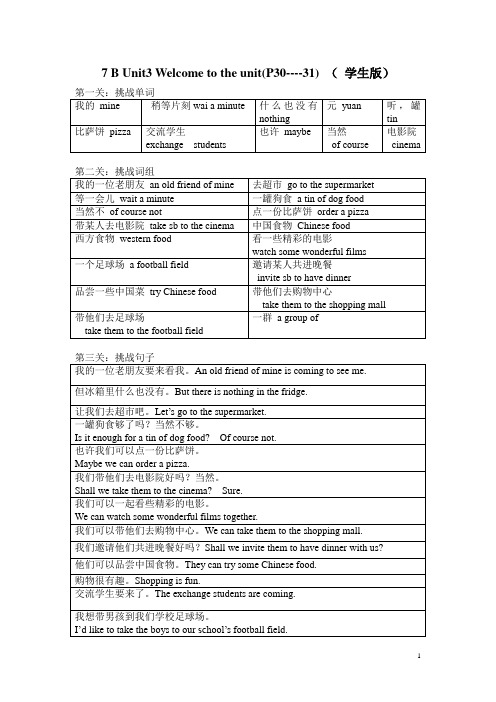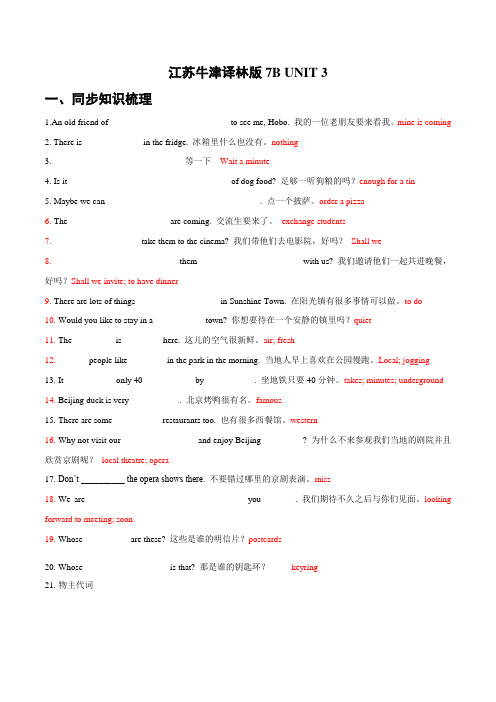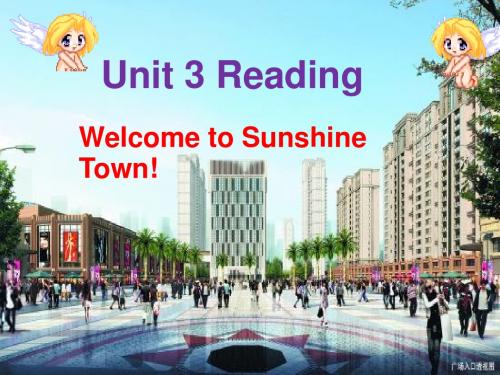(完整版)新版译林英语7BUnit3知识点
译林英语七下第三单元知识

购物很有趣。Shopping is fun.
交流学生要来了。The exchange students are coming.
我想带男孩到我们学校足球场。
I’d like to take the boys to ourschool’s football field.
theatre
错过miss
向前forward
很快soon
昂贵expensive
礼物present
\
第二关:挑战词组
一个关于阳光镇的视频
a video aboutSunshineTown
为…..做准备prepare…for…
= get…ready for
新鲜的空气fresh air
在镇中心in the town centre
7BUnit3 Welcome to the unit(P30----31)(默写版)
第一关:挑战单词
我的
没有什么
也许
元
听,罐
比萨饼
交流学生
稍等片刻
当然
电影院
第二关:挑战词组
我的一位老朋友
去超市
等一会儿
一罐狗食
当然不
点一份比萨饼
带某人去电影院
中国食物
西方食物
看一些精彩的电影
一个足球场
邀请某人共进晚餐
第二关:挑战词组
我的一位老朋友an old friend of mine
去超市go to the supermarket
等一会儿wait a minute
一罐狗食a tin of dog food
当然不of course not
7B Unit3知识点整理

7B Unit3知识点整理1、across意为从一边到另一边“横过”、“穿过”,相当于from one sideto the other.如:Be careful when you walk across the street.2、along意为“沿着,循着”We walk along the road.3、over“越过,、从…上边过去”The boy climbed over the wall.4、up可以作介词和副词,意为“往上”,“向…上” .He climbed up a mountain.5、down做副词,表示从高处往下。
“向…下”或“沿着…往下”。
The ship sails down the river.6、round介词,意思是“环绕”、“围绕”。
The earth moves round the sun.7、from介词,意思是“从……”、“距”、“离”、“来自…”表示时间,地点的起始和来源I came to Nanjing from Hangzhou.8、to“向、往、到”I walk to school every day.9、through表示“通过”、“穿过(空间)”The hunter walked through the forest.Exercises:1.The train is going ______ the tunnel.2.The cat is climbing _______ the tree.3.Tom likes jumping _______ the chair.4.The students are running________ the playground in the P.E.class.5.Mike walks______ school every day.6.If the traffic light is red. You can’t walk________ the road.7.My cousin often takes his pet a walk_______一般将来时1.Simple future tense with “will” and “shall”We use “will” or “shall” when we talk about: things th at will happen, plans that we are making now.e.g. She will be late for the party.We will take the dog to the park tomorrow.We make negative sentences like this:I/We will not/shall not goHe/She/It/You/They will not goWe ask questions using the simple future tense like: Will/shall I/We like go?Will He/She/It/You/They like go?We answer questions like this:Yes, I/we will/shall.Yes, he/she/it/you/they will.No, I/we will not/shall not. No, he/she/it/you/they will not.2.We can use “be going to” when we talk about:1)Fixed plans for a certain time in near future.e.g. I’m going to take another route.2)Things that will probably happen.e.g. It’s so cloudy. I think it is going to rain.We ask and answer questions wit h “be going to” like this.Am I Are you/we/they going to see the doctor tomorrow?Yes, you/we/they are.No, you/we/they are not.3、will/shall和be going to表示将来的区别Be going to既可指主观打算,也可指客观迹象表明将要发生的事;will/shall往往指没有经过计划、临时决定将要发生的事,常伴有说话者的主观意志或将来必然发生的事。
译林牛津7B Unit3 Integrated skills课件 (共37张)

Fengxian Palace
Baohe Palace
Huangji Palace
Zhonghe Palace
Taihe Palace
Taihe Palace 太和殿
Taihe Palace
golden throne 金色的 御座
金銮宝座
Zhonghe Palace 中和殿
Zhonghe Palace
11.00 a.m. 4. See Chinese paintings in _HB_au_oa_hn_egji Palace at
1.00 p.m. 5. See clocks andw_l_a_mtc_hp_ess in Fengxian Palace
at 2.30 p.m.
the Palace Museum
译林牛津7B Unit3 Integrated skills课件 (共37张)
Unit 3 Welcome to Sunshine Town!
Integrated skills
Objectives
1.能通过海报和听力材料获取有关故宫的 知识
2.能掌握一些新的词汇,并学会用正确的 表达方式谈论出行计划。
1. See the golden throne in Taihe Palace at 11_00_.._00_00_ap_.._mm..
2. Go to Zhonghe Palace at _11_00_..13_30__aa_..m_m_.. 3. Go to H_B_ua_oa_hn_eg_ji Palace to see works of art at
Attention:
What can we do for our hometown?
7B unit 3 同步语言点原文原句原词重现默写(有答案)(牛津译林版)

江苏牛津译林版7B UNIT 3一、同步知识梳理1.An old friend of _______ _________ __________ to see me, Hobo. 我的一位老朋友要来看我。
mine is coming2. There is _____________ in the fridge. 冰箱里什么也没有。
nothing3.__________ _________ _________ 等一下Wait a minute4.Is it ___________ ________ ________ ________ of dog food? 足够一听狗粮的吗?enough for a tin5.Maybe we can ____________ ___________ ___________. 点一个披萨。
order a pizza6.The ___________ ___________ are coming. 交流生要来了。
exchange students7._________ __________ take them to the cinema? 我们带他们去电影院,好吗?Shall we8._________ _________ _________ them ______ ______ __________ with us? 我们邀请他们一起共进晚餐,好吗?Shall we invite; to have dinner9.There are lots of things _________ _________ in Sunshine Town. 在阳光镇有很多事情可以做。
to do10.Would you like to stay in a ___________ town? 你想要待在一个安静的镇里吗?quiet11.The _________ is _________here. 这儿的空气很新鲜。
牛津译林7BUnit3词汇,短语%2C句型汇总

牛津译林7BUnit3词汇,短语,句型一、词汇Words1. mine pron. 我的mine 是名词性物主代词,用在句子中代替名词。
而my是形容性物主代词,只能在句子中表示“某人的”。
用法:形容词性物主代词后面要加名词名词性物主代词相当于名词单独使用2. quiet adj.安静的,寂静的quiet 用作形容词,修饰人等有生命物体时表示“安静的”之意,修饰地方、时间、海洋大地时表示“寂静”之意。
常用“安静”;“保持安静”;a quiet sea “平静的海洋”等。
后加构成副词形式。
3. fresh adj. 新鲜的fresh 用作形容词,意思是“新鲜的”。
常指空气、水、水果、蔬菜、鱼、肉等“新鲜的”,也可以指人的思维、人的言行是“新鲜的”、不同凡响。
4. famous adj. 出名的,著名的famous 用作形容词,表示“出名的,著名的”,可以用作表语、定语、宾语补足语等句子成分。
可以构成“因…….(某事)而出名/著名”。
“因…….(身份)而出名/著名”。
小试牛刀:( )1. Xu Beihong is for his horse paintings.A. freshB. famousC. interestingD. important( ) 2. ---What is Suzhou famous______? ----Suzhou Gardens.A. \B. forC. asD. with( ) 3. ----What is Suzhou famous______?----Chinese Venice.(威尼斯)A. \B. forC. asD. with5. key n 钥匙,答案,键,关键key用作名词,意为“钥匙;答案;关键”,其复数形式是。
(1)key表示“钥匙”之意时,常用“这个门的钥匙”固定搭配。
(2)key表示“答案”之意时,常用“这个问题答案”固定搭配。
(3)key表示“键”之意时,是指电脑、打字机、钢琴等“键盘上”的“键”。
江苏译林最新版【7B】_Unit3_Reading

Para 3
1.What can you do in Sunshine Town?
We can buy wonderful presents there.
2.Are the things in the shops there expensive? Most things are not expensive.
1.fresh(line4)___ b e 2.local(line5)___
a not hear, see or have sth b very clean or cool are going to enjoy sth
d c feel happy because you 3.famous(line13)___ a 4.miss(line18)___ 5.look forward to c (line20)___
Where is it?
In the town centre.=In the centre of the town.
local people
foreign people They are jogging in the park.
They like jogging in the park
How can people in Sunshine Town go to Beijing? By underground
Sunshine Town is a very quiet town. The air is fresh here .There is a _______in the park town centre. Local people like jogging ______there. It’s only 40 minutes from the center of Beijing by underground . There are lots of nice_______ shops in the town. Most things are cheap ______. It’s a good place to______ enjoy nice food. If you like Chinese food, you can try______________. Beijing duck If you don’t like Chinese food, there are lots of Western _________ restaurants, too. Do you like Beijing Opera? Why don’t you visit our local theatre with us? You can enjoy Beijing Opera here.
牛津译林英语7B Unit3知识点
牛津译林英语7B Unit3 知识点总结一、重点语言点1、an old friend of mine/my father’s 我其中的一位老朋友名词性物主代词mine yours his hers its ours yours theirs他们的用法相当于形容词性物住代词加名词He lives in the flat next to ours.=He lives in the flat next to our flat.=He lives next to us.他住在我们隔壁。
2、wait a minute =just a moment稍等3、There’s nothing/not anything in the fridge . 冰箱里什么也没有。
There is___C______in today’s newspaper.A. interesting nothingB. interesting anythingC. nothing interestingD. anything interesting注意一下:形容词修饰不定代词需要后置。
4、Is it enough for a tin of dog food? (买)听狗食足够了吗?I am_______________ to carry the heavy box. 我很结实能搬动那只大箱子。
Do you have____________________(足够的时间)5.There’s sb doing sth 有......正在做......There are two boys playing football on the playground.有两个男孩在操场踢足球。
6. It’s ten minutes’walk /two hours’bus ride/two hours’on foot from here to my school注意一下:对距离进行提问要用how far提问7.exchange students 交换生exchange (n) 交易,交换(v)交换,互换,调换8、take them to the cinema 带他们去电影院take sb to +地点带某人去某地9、Shopping is fun. 购物是件有趣的事go shopping 去购物shopping list 购物清单10、invite them to have dinner with us 邀请他们和我们一起共进晚宴invite sb to a party / one’s birthday邀请某人参加聚会/某人的生日invite sb to do sth邀请某人做某事Eg. I invite you to come to the party. 我邀请你来参加聚会。
(完整版)7BUnit3Exercises(3)牛津英语新译林版(最新整理)
Class___________ Name__________省锡中实验学校7B Unit3 Exercises A学科:初一英语主备:王文娟审核:周敏日期:2013-3-15一、词汇:1. Eddie wants to _____________(订购) a pizza with only five yuan.2. An old friend of ____________(我的) is coming to visit me, Kitty.3. ___________(没有什么) can stop him helping those poor children.4. Are there any ______________(交换) students from the USA in your class?5.The _______________(信息) on the blackboard is very important.6.Can you teach us how to use the ____________(机器)? We want to use them to finish the work.7. My sister is among the best (工程师) in the company8. Those ______________(postman) neighbours are kind and ___________(乐于助人的).9. His grandpa lives in a flat about ten __________(分钟) walk from here.10.Your aunt is __________(call) you from the country _____________(call) France.11. It’s quite strange that there are no v_____________ in this museum.12. My e_____________ sister is two years older than I .13. The CDs are one of the _______________(policeman). He likes listening to music.二、用所给动词的适当形式填空:1. Look! A group of students ____________(play) softball over there.2. There ______________(be) a football match in our school next week, isn’t there?3. He is the first ___________(get) to the station.4. Millie with her friends _________(go) to the Reading Club twice a week.5. Shall we invite Jim ___________(join) in the party with us?6. There are thousands of people ____________(visit) those beautiful flowers in the park at the moment.7. Who ________________(teach) them English in two weeks? Mr. Feng is.8. He hopes each of us _______________(pass) the exam.9. I ___________(help) Amy with her homework this evening. We ___________(have) a picnic in the park this Sunday. My mother _____________(buy) a lot of food for it.10.He enjoys ___________(take) photos very much. He with his friends ___________(stay) in thepark to take photos these days. They ___________(have) a photo show next month.11.Our engineers are here ___________(help) you with your problems.三、翻译句子:1. 他的一位老朋友明天晚上将来拜访他。
牛津译林版七年级英语下册(7B) Unit3 Welcome课件
will take him to a famous Western restaurant. But
it is very far away so we have to go there by
underground. [`ʌndəɡraund]
On weekends,I take him to the local [`ləukəl]
[`θiətə]
theatre to watch films.I don’t want miss
interesting films.
[mis]
[`fɔ:wəd]
But he is looking forward to enjoying Beijing [o`pɒperrəa] there.I hope some actors
Learning aims
• 1.Learn the new words. • 2.Understand the article on p32.
Task1 New words
Tomas—an exchange student
He comes from Hungary. (匈牙利) Now he can speak Chinese well.
Chinese food there is wonderful and it is near my
home. It takes only ten minutes to get there on foot. If he wants to try some W[`ewsetsetərnn] food, I
not
5.You can eat Beijing duck in the town.
T
最新江苏译林版牛津英语7Bunit3所有词组与重点句式结(精)
最新江苏译林版牛津英语7Bunit3所有词组与重点句式结(精)Unit 3Comic and welcome1.an old friend of mine = one of my friends我的一个朋友/doc/ab17618274.html,e / go to do sth来/去做某事3.There is nothing in the fridge .冰箱里什么也没有。
4.Let's do sth .让我们做某事吧5.go to the supermarket 去超市6.wait a minute 稍等7.be enough for .....对........来说是足够的eg, It is enough for a tin of dog food . 足够买一听狗食8.be +adj.+enough to do sth足够...... 做某事eg, He is old enough to look after himself.他足够大照顾自己。
9.V. +adv. enough to do sth 足够...... 做某事eg, He runs fast enough to catch up the bus .他跑得足够快能赶上公交车。
10.a tin of ....,一听.......11.order a pizza订购比萨饼12.exchange students from the UK来自英国的交流学生13.a group of ...,一组/群......14.enjoy Chinese food享受/喜欢中国食物15.watch films = watch a film看电影16.watch some wonderful films看一些精彩的电影17.love playing football酷爱踢足球18.take sb to +sp带某人去某地19.our school's football field我们学校的足球场20.invite sb to do sth 邀请某人做某事21.invite sb to +sp邀请某人到某地22.an invitation letter一封邀请函23.have dinner with sb与某人一起吃晚饭24.try / taste some Chinese food品尝一些中国食物Reading :25.a video about .....一个关于......的录像26.There are lots of things to do in sp在某地有许多事可做27.stay in a quiet town待在一个安静的小镇28.in the town centre = in the centre of the town 在镇中心29.local people本地人30.like jogging in the morning喜欢早上慢跑31.be far ( away from ....,离.....远32.be close to .....,离.....近33.It takes sb some time to do sth .做某事花费多长时间做某事34.spend ....( in doing sth 花费时间或金钱做某事(主语必须是人35.spend .....on ...在.....方面花费多少时间或钱36.cost sb +money 花费某人多少钱37.most things大多数东西38.buy some wonderful presents for sb为某人买卖一些精美的礼物39.buy sb sth = buy sth for sb为某人买某物40.be famous for .....,以.......而出名41.eat Chinese food吃中餐42.many Chinese / western restaurants许多中国/西餐馆43.Why not do sth ?为什么不做某事?44.Why don't you do sth ?你(们为什么不做某事?45.How / What about ......?.....怎么样?46.Would you like to do sth ?你愿意做某事吗?47.Let's do sth ,shall we ?让我们做某事,好吗?(双方一起做48.Let us do sth , will you ?让我们做某事,好吗?(说话者单方面做49.learn more about .....了解许多有关......50.learn to do sth 学习/学会做某事51.learn from .....,像..... 学习52.learn how to do sth学习/学会如何做某事53.Chinese art中国艺术54.enjoy Beijing opera欣赏京剧55.miss the opera shows错过京剧表演56.look forward to doing sth期盼做某事57.a good place to do sth一个做某事的好地方58.feel happy / well / better感觉快乐/好/更好59.known by sb 被某人知道或认识60.the local theatre当地剧院61.the things in the shop62.---Who's speaking , please ?请问你是哪位?(电话用语------ This is ......(speaking .我是...... (电话用语63.May I speak to .....?.......在吗?(电话用语64.have a good time = have fun = enjoy oneself玩得开心65.have fun doing sth 开心做某事Grammar:66.call sb from sp 从某地给某人打电话67.belong to ....属于.......68.get mixed up混淆69.all over the place70.next to........在.....隔壁INTEGRATED SKILLS :71.a day at the Palace Museum在故宫的一天72.read a poster about ....读一则有关.....的海报73.the shows at the Palace Museum故宫的展出74.There are many things to see here .这儿有许多东西可看75.works of art 艺术品76.see works of art看艺术品77. Chinese paintings中国画78.see Chinese paintings看中国画79.many / much more .....许多更多的....... 80.learn all about .....了解许多有关.......81.China's history at the museum博物馆里的中国历史82.write down information about ....记下有关.....的信息83.make some notes做些记录84.make a plan for ....制定......的计划85.row a boat on the lake在湖上划船86.What time shall we meet ?我们将于何时碰头?87.in front of ....在......前面(外部88.in the front of ......在......前面(内部89.How far is it from the hotel ?它离旅馆多远STUDY SKILLS and TASK:90.own a four-bedroom flat拥有一套4个卧室的公寓91.need some exercise books需要一些练习本92.go /come with sb = follow sb跟随某人93.at the bookshop在书店94.watch TV on Sunday morning在星期天早上看电视95.raise cows养奶牛96.grow wheat种小麦97.the buses to the town centre通向镇中心的公交车98.on a farm在农场99.smell the flowers闻到花香100.hear the birds sing听到鸟鸣(经常性,强调结果 101.hear the birds singing听到鸟在叫(一次性,强调过程 102.hear / see sb do sth 听到/看到某人做某事(经常性,强调结果103.hear / see sb doing sth听到/看到某人正在做某事(一次性,强调过程 104.row a boat划船105.know each other 互相了解106.be friendly to ....对..... 有好107.drive sb there开车送某人去那儿108.drive sb to +sp开车送某人去某地109.do the shopping 去购物110.enjoy our life (我们享受生活111.a wonderful place to live 一个值得居住的极好地方。
- 1、下载文档前请自行甄别文档内容的完整性,平台不提供额外的编辑、内容补充、找答案等附加服务。
- 2、"仅部分预览"的文档,不可在线预览部分如存在完整性等问题,可反馈申请退款(可完整预览的文档不适用该条件!)。
- 3、如文档侵犯您的权益,请联系客服反馈,我们会尽快为您处理(人工客服工作时间:9:00-18:30)。
基础知识短语归纳1. wait a minute 等一会儿2. a can of一罐……3. order a pizza 点一个披萨饼4. would like想要5. lots of 许多6. far from 离……远7. by underground 乘地铁8. welcome to 欢迎到……9. call sb 给某人打电话10. belong to 属于11. all over 到处;遍及12. next to 紧靠着13. works of art 艺术品14. in front of在……前面15. talk about谈论16. each other 互相17. around the yard 院子四周用法集萃1.would you like to do sth= want to do sth 想要做某事2.look forward to(doing) sth 盼望(做)某事3.What about(doing) sth (做)……怎么样4.some……others……一些……另一些……5.show sb around 带领某人参观6.why not do sth 为什么不做某事7.It takes (sb)some time to do sth 花费某人时间去做某事8.let sb do sth 让某人做某事9.enough 与形容词连用时,形容词放在enough前面例如:He is old enough to go to school.10.辨析:maybe与may be的区别maybe是副词,意为“也许,可能,大概”;may be ——may是情态动词,be是系动词,may be 的意思是“可能是”。
例句:Maybe he is a doctor.例句:Your book may be in your bag.11.enjoy oneself=have a good time= have fun 玩得愉快12.watch拓展:watch sb do sth看见某人做过某事watch sb doing sth 看见某人正在做某事13.“There is/ are +名词+to do…… ”意思为“有……可做”例句:There is some homework to do this weekend. 这个周末有一些家庭作业要做。
14.“go+动词的ing形式”常在“根据动词的适当形式填空”中考查其后所接的动词ing形式;也常在“句型转换”中考查它与同义短语“do some/ the+动词的ing形式”的转换。
Go shopping= do some shopping15.famous“著名的,有名的”,既可以做定语,也可以做表语①be famous for “因……而著名/出名”China is famous for the Great Wall.②be famous as…… “作为……而出名”He is famous as a singer.16.注意:在含有if引导的条件状语从句的主从复合句中,主句用一般将来时,从句常用一般现在时表示来。
例句:We won’t go to the park if it rains tomorrow.17.why not do sth和why don’t do sth 均可意为“为什么不做某事呢?”18.teach“教”①教某人某事teach sb sth/ teach sth to sb例句:Her mother teaches us English=Her mother teaches English to us.②教某人做某事teach sb to do sth例句:Can you teach me to sing the song? 你能教我唱这首歌吗?19.look at “看“,强调动作;look after“照顾,照看”;look like“看起来像……”look the same “看起来一样”;look for“寻找”20.在英语中,以here开头的句子,如果主语是名词,则用倒装语序,连系动词是用is还是are取决于后面的名词是单数还是复数。
Here is a card for you.注意:当主语是代词时,不用倒装语序。
Here they come. 他们来了;here it is 它在这里;here you are 给你21.work 表示“工作,劳动”时,为不可数名词表示“作品”时,为可数名词。
例如:works of art22.“It’s about +所需时间+(from A to B)+by+交通工具”例句:It is about three hours Su zhou to Nanjing by car.23. want sb to do sth 想要某人做某事24. tell “告诉” tell sb sth “告诉某人某事”或“tell sth to sb”Tell s b to do sth “告诉某人做某事”25. another 意为“另一个,再一个”,后面接可数名词单数,通常用于指三者或者三者以上。
This pair of shoes is too small for me. Please show me another pair.拓展①another +数词+名词复数=数词+more+名词复数,意为“再来……”例句:We need another five desks/ five more desks.②the other 指两者中的“另一个”,有特定的数量范围,不是任意的“另一个”例句:Here are two rulers. One is short, and the other is long解析:other 后面接复数名词;others 后不能接名词;the other 为两者当中的另一个;another 表示“再,又;别的,其他的”,指三者或三者以上的另一个。
26. smell 作连系动词,意为“闻起来”,其后接形容词作表语。
例句:The flowers smell good.27. sometimes 有时;some times 几次,几倍;sometime 某时;some time 一段时间28. ①some……others 意为“一些……,另外一些……”,表示除去一部分以后的另一些,但不是剩下的全部。
例句:Some people like singing, and others like dancing.②Some……the others……意为“一些……,其他的……”,表示一定范围内除去一部分以后其余的全部。
29. be friendly to sb “对某人友好”,指对别人的态度好、热情,相当于be kind to sb例句:My classmates are friendly to me. 我的同学都对我很友好Be friendly with sb “和某人关系好”或“某人要好”,指的是两者额关系例句:The classmates in our school are friendly with each other.我们班上的同学关系都很好。
30. wish sb to do sth; hope to do sth语法一:形容词性物主代词和名词性物主代词(一) 物主代词的定义及分类所谓物主代词,就是表示所有关系的代词,即表示“我的”“你的”“他的”“她的”“我们的”“你们的”“他们的/她们的/它们的”的词。
物主代词分为名词性物主代词和形容词性物主代词(1)形容词性物主代词(2)名词性物主代词名词性物主代词=形容词性物主代词+名词(二)物主代词的用法1.形容词性物主代词具有形容词的特性,在句中作定语,后面必须接名词。
They are doing their homework2.名词性物主代词具有名词的特性,后面不能接名词。
它相当于“形容词性物主代词+名词”,在句中可以作主语、宾语或表语。
—Whose book is this?这是谁的书?——It’s mine.3.“of+名词性物主代词”可以作名词的后置定语。
The girl is a friend of his. 那个女孩是他的一个朋友。
练习1.The lovely girl is from Class6. name is Alice.A. HerB. HisC. YourD. Its2. —Peter, is this your pen?—Yes, it’s . Many thanks. I looked for it everywhere.A. mineB. meC. I3. —I can’t find my dictionary. May I use ?—Sure. Here you are.A. youB. yourC. yoursD. yourself语法二——名词所有格名词所有格用来表示人或物的所有和所属关系,包括’s 所有格和of 所有格两种形式1.’s 所有格表示有生命的人或物的名词所有格,单数名词和不以s 结尾的复数名词通常在词尾加’s;以s结尾的复数名词只在词尾加’.My brother’s bike Children’s DayStudents’ books注意:(1)如果所指人或物为两个或几个人所共有,则只在最后一个名词后加’sThis is Jane and Mary’s roomLily and Lucy’s mother is a doctor.(2) 如果所指人或物为各自所有,则应在每个名词后都加’sThese are Jan e’s and Mary’s room.Lily’s and Lucy’s mothers are both doctors.2.of所有格物生命事物名词的所属关系,常用“of+名词”来表示,即of所有格。
The capital of ChinaThe name of the river练习① My skirt is on the hair.A. sisters’B. sisterC. sistersD. sister’s②—Look at that photo. What a happy family!—Yes, it’s a photo my family.A. atB. forC. ofD. in③Looking after children is not only work, men should also do it.A. woman’sB. womenC. women’sD. womens’④—September 10th is Day in China, isn’t it?A. A teacherB. Teachers’C. Teach erD. Teachers。
